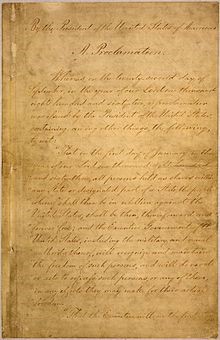 In his Easter Sunday message to Tab titled, “Already and Not Yet,” Rev. John Gable made the point that an event (e.g., the Resurrection of Christ) and the implications of an event (e.g., Salvation and the full coming of God’s Kingdom) do not always occur simultaneously. It may take time for the expected results to be realized.
In his Easter Sunday message to Tab titled, “Already and Not Yet,” Rev. John Gable made the point that an event (e.g., the Resurrection of Christ) and the implications of an event (e.g., Salvation and the full coming of God’s Kingdom) do not always occur simultaneously. It may take time for the expected results to be realized.
To illustrate this point, he remembered the Emancipation Proclamation, issued by the Executive Order of President Abraham Lincoln on January 1, 1863 (Note: a preliminary draft of the same was issued several months earlier on Sept 22, 1862). On that New Year’s Day in 1863, exactly nothing happened. The ten southern states ‘still in rebellion’ did not recognize Lincoln or his Proclamation. Still, many enslaved people rejoiced in the hope and promise of their coming freedom.
The actual cessation of slavery did not occur until the end of the war in 1865 as commemorated by the celebration of Juneteenth as succinctly summarized in this paragraph from Wikipedia:
“Juneteenth is a federal holiday in the United States commemorating the emancipation of enslaved African Americans. Deriving its name from combining “June” and “nineteenth”, it is celebrated on the anniversary of General Order No. 3, issued by Major General Gordon Granger on June 19, 1865, proclaiming freedom for slaves in Texas. Originating in Galveston, Juneteenth has since been observed annually in various parts of the United States, often broadly celebrating African-American culture. The day was first recognized as a federal holiday in 2021, when President Joe Biden signed the Juneteenth National Independence Day Act into law after the efforts of Lula Briggs Galloway, Opal Lee, and others.”
Tab’s Diversity and Justice Awareness Team would like to recommend a special exhibit at the Indiana State Museum, “Influencing Lincoln: The Pursuit of Black Freedom,” to the congregation. The exhibit, which is now open thru Oct 29, 2023, includes the above information, PLUS, information on the three ‘Reconstruction Amendments’ to the US Constitution (13, 14, and 15) as well as influential members of the Black American community (e.g., Frederick Douglass, Elizabeth Keckly & William Slade, Chaplain Garland White, and the Revels Brothers)
For more information:
Indiana State Museum: https://www.indianamuseum.org/experiences/influencing-lincoln/ (accessed 4/10/2023)
Wikipedia.org: https://en.wikipedia.org/wiki/Juneteenth (accessed 4/10/2023)
Wikipedia.org: https://en.wikipedia.org/wiki/Emancipation_Proclamation
